Open
Definition
The word "open" refers to the act of allowing access, entry, or visibility. It can describe a state of being not closed or locked, an action of making something accessible, or a quality of being receptive or honest.
Parts of Speech
- Verb
- Adjective
- Noun
Pronunciation
American English
- IPA Pronunciation: /ˈoʊ.pən/
- Respelling: OH-puhn
British English
- IPA Pronunciation: /ˈəʊ.pən/
- Respelling: OH-puhn
Etymology
The term "open" originates from the Old English "openian" (verb) and "open" (adjective), meaning "not shut" or "exposed." It is derived from Proto-Germanic "*upana," which relates to the Proto-Indo-European root "*upo" (under or up). Its modern meanings encompass both physical and metaphorical contexts.
Derivatives
- Openness (noun)
- Openly (adverb)
- Reopen (verb)
- Open-ended (adjective)
- Open-minded (adjective)
Synonyms
- Accessible
- Unlocked
- Transparent
Antonyms
- Closed
- Locked
- Restricted
Usage
The term "open" is used in various contexts, such as describing physical states ("The door is open"), actions ("Please open the window"), or attitudes ("He is very open to new ideas").
Related Terms
- Accessible: Easily reached or entered.
- Public: Open or available to all.
- Transparent: Clear and easy to understand or see through.
Detailed Definitions
Verb
- To move something to allow access or visibility: Refers to the action of making an entry or passage available.
- Example: "She opened the window to let in fresh air."
- To begin or start something: Refers to initiating an event or process.
- Example: "The store will open at 9 a.m."
Adjective
- Not closed, covered, or blocked: Describes a state where access or entry is possible.
- Example: "The box is open on the table."
- Receptive or willing to consider new ideas: Describes an attitude of acceptance or transparency.
- Example: "He is open to suggestions."
Noun
- An unrestricted or unobstructed state: Refers to an area or condition without barriers.
- Example: "The park is an open for public use."
- A competition or event accessible to all: Used in sports or other contexts to describe inclusive events.
- Example: "He won the tennis open last year."
open



🇨🇳 Mandarin Chinese
- "打开" (Dǎkāi) – in the sense of "to open"
- Pronunciation: /taʔ˥˩kʰaɪ˥/
- Respelling: "daa-kai"
- "开放" (Kāifàng) – in the sense of "open" as in available or accessible
- Pronunciation: /kʰaɪ˥fɑŋ˧˥/
- Respelling: "kai-fang"
🇮🇳 Hindi
- "खोलना" (Kholna) – in the sense of "to open"
- Pronunciation: /khoːlnaː/
- Respelling: "kho-lna"
- "खुला" (Khula) – in the sense of "open" as in not closed
- Pronunciation: /kʰʊlaː/
- Respelling: "khoo-la"
🇪🇸 Spanish
- "Abrir" – in the sense of "to open"
- Pronunciation: /aˈβ̞ir/
- Respelling: "a-bir"
- "Abierto" – in the sense of "open" as in not closed
- Pronunciation: /aˈβ̞jerto/
- Respelling: "a-byer-to"
🇫🇷 French
- "Ouvrir" – in the sense of "to open"
- Pronunciation: /uvʁiʁ/
- Respelling: "oov-reer"
- "Ouvert" – in the sense of "open" as in not closed
- Pronunciation: /uˈvɛʁ/
- Respelling: "oo-veh-r"
🇸🇦 Arabic (Modern Standard)
- "فتح" (Fatah) – in the sense of "to open"
- Pronunciation: /fataħ/
- Respelling: "fa-tah"
- "مفتوح" (Maftooh) – in the sense of "open" as in not closed
- Pronunciation: /maftuːħ/
- Respelling: "maf-too-h"
🇧🇩 Bengali
- "খোলা" (Khola) – in the sense of "to open"
- Pronunciation: /kʰola/
- Respelling: "kho-la"
- "খোলা" (Khola) – in the sense of "open" as in not closed
- Pronunciation: /kʰola/
- Respelling: "kho-la"
🇷🇺 Russian
- "открыть" (Otkryt') – in the sense of "to open"
- Pronunciation: /ɐtˈkrɨtʲ/
- Respelling: "ot-krit"
- "открытый" (Otkrytyy) – in the sense of "open" as in not closed
- Pronunciation: /ɐtˈkrɨtɨj/
- Respelling: "ot-kri-tyi"
🇵🇹 Portuguese
- "Abrir" – in the sense of "to open"
- Pronunciation: /aˈbɾiɾ/
- Respelling: "a-bree-r"
- "Aberto" – in the sense of "open" as in not closed
- Pronunciation: /aˈbɛɾtu/
- Respelling: "a-ber-to"
🇮🇩 Indonesian
- "Membuka" – in the sense of "to open"
- Pronunciation: /məm'buka/
- Respelling: "mem-boo-ka"
- "Terbuka" – in the sense of "open" as in not closed
- Pronunciation: /tər'buka/
- Respelling: "ter-boo-ka"
🇩🇪 German
- "Öffnen" – in the sense of "to open"
- Pronunciation: /ˈœfn̩/
- Respelling: "erf-nen"
- "Offen" – in the sense of "open" as in not closed
- Pronunciation: /ˈɔfn̩/
- Respelling: "of-nen"
🇯🇵 Japanese
- "開く" (Hiraku) – in the sense of "to open"
- Pronunciation: /hiɾa.kɯ̟β/
- Respelling: "hi-ra-ku"
- "開いている" (Aite iru) – in the sense of "open" as in not closed
- Pronunciation: /a.i.te i.ɾɯ̟β/
- Respelling: "ai-te i-ru"
🇻🇳 Vietnamese
- "Mở" – in the sense of "to open"
- Pronunciation: /mɤ˧˥/
- Respelling: "muh"
- "Mở cửa" – in the sense of "open" as in not closed
- Pronunciation: /mɤ˧˥ kʷaː˧/
- Respelling: "muh kwa"
🇰🇷 Korean
- "열다" (Yeolda) – in the sense of "to open"
- Pronunciation: /jʌl.da/
- Respelling: "yeol-da"
- "열린" (Yeollin) – in the sense of "open" as in not closed
- Pronunciation: /jʌl.lin/
- Respelling: "yeol-lin"
🇹🇷 Turkish
- "Açmak" – in the sense of "to open"
- Pronunciation: /ˈatʃˌmak/
- Respelling: "ach-mak"
- "Açık" – inthe sense of "open" as in not closed
- Pronunciation: /aːˈdʒɯk/
- Respelling: "a-jik"
🇵🇰 Urdu
- "کھولنا" (Kholna) – in the sense of "to open"
- Pronunciation: /khoːlnaː/
- Respelling: "kho-lna"
- "کھلا" (Khula) – in the sense of "open" as in not closed
- Pronunciation: /kʰʊlaː/
- Respelling: "khoo-la"





